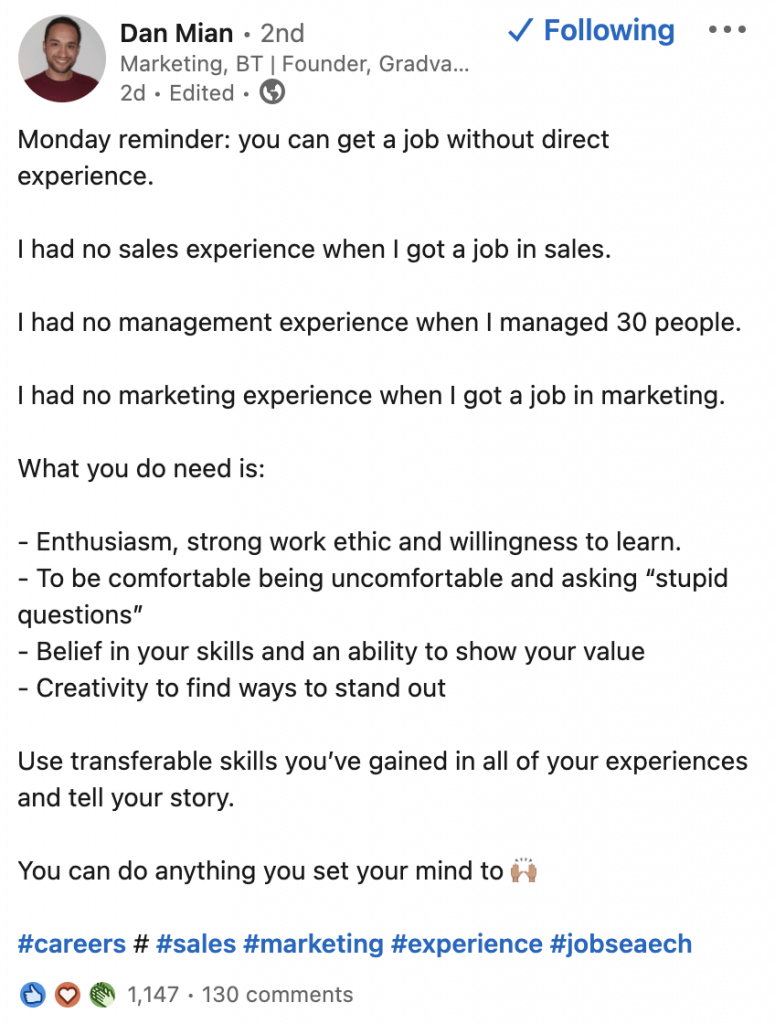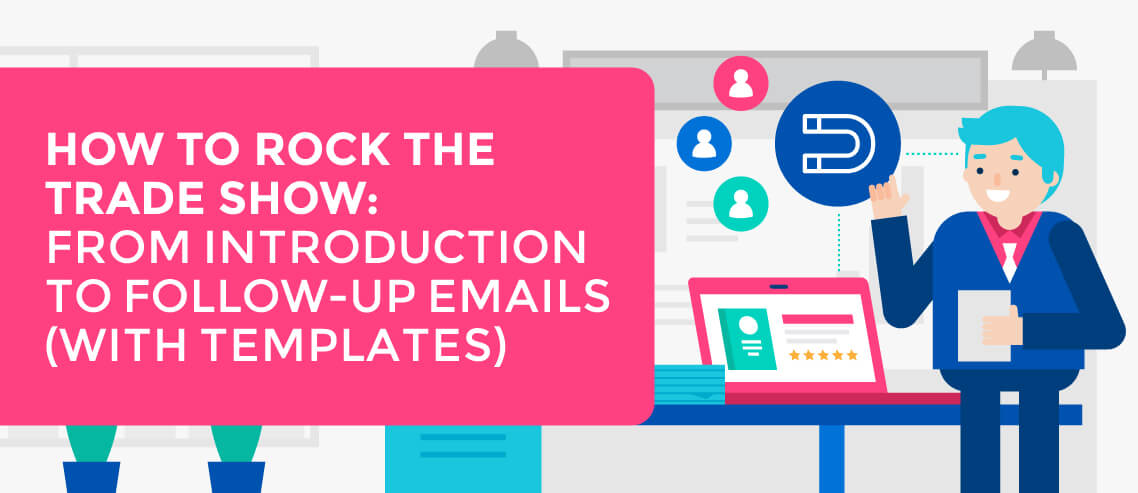How to Get a Sales Job Without a Degree: Wisdom from Top Sales Leaders & Recruiters

Contents
Recently, we’ve seen conversations on LinkedIn and discussions in communities about whether candidates without a college degree can land a sales job.
Like any other industry, it can be difficult for candidates without traditional experience or a college degree to land a job in a new field. To help you land your first sales job, we gathered advice from nine top sales executives and recruiters to show you how to break into the industry without a degree.
So, before giving up on your dream sales job because you think it’s the end of the road, hit pause and hear what these leaders have to say.
Let’s dive in!
1. Don’t be afraid to learn on the job
For those interested in Sales after completing college or even in mid-career, it’s never too late to start on a new path. If you don’t believe us, ask Timothy Dixon-Traylor, a Recruiter/Talent Acquisition Specialist at Integral Ad Science who has a degree in Theatre and had a background in Hotels & Administrative Work.
Timothy taught himself in order to make the career switch to HR/Sales Recruiting. According to him, “I didn’t take any certification or courses to increase my skills in Recruiting. I’m inquisitive by nature, so I did a lot of research on Recruiting Best Practices, learned from Thought Leaders on LinkedIn/at the companies I’ve worked for, and not being afraid to learn from my hiccups. I got a part-time job as a Recruiting Coordinator about six months after college, and the rest they say is history.”
On how applicants with no sales background can stand out, Timothy says:
“Don’t ever let not having a degree steer you away from pursuing Sales as a career. The most successful salespeople do most, if not all, of their learning “on the job.” Qualities like being data-driven, the ability to listen, being inquisitive, tenacious, and constantly learning are traits that the most successful salespeople possess. You can also learn via free or cheap training programs while learning about sales methodologies such as Sandler, Challenger, and Value Selling.
Highlighting skills such as working in fast-paced environments, having the ability to learn, being organized, and being goal-oriented can help attract talent from all walks of life.”
As for hiring managers and recruiters, Timothy suggests, “They need to explicitly encourage people without degrees and sales experience to apply to their roles. The data shows underrepresented groups are less likely to apply to jobs they don’t 100% qualify for. Think less about the ‘hard sales skills’ and more about teachable skills.”
2. Tell your story
In a crowded job market, storytelling can be your secret weapon. Everyone loves stories, irrespective of age or socio-economic status. Stories that engage and attract usually have a common theme: a compelling protagonist or hero. The hero knows what they want; they have clear goals and the will to beat all odds. It’s why we like and root for heroes in movies and books.
It’s no different for job seekers. Storytelling is an important part of the application process. Successful candidates become heroes that hiring managers and recruiters love, remember, and root for because they used storytelling in their cover letters, CVs, and interviews.
According to the Regional Director of Corporate Sales at DataRobot, Jenny Anderson, “APPLY ANYWAY, even if you don’t have a degree! If you’re asked if you have a degree via the ATS, assume it’s a knockout question and try to get a referral in. But, the BEST advice I can give is to evaluate your resume. We’ve all heard the saying, ‘Facts & numbers tell, but stories sell.’ So, use your resume as your fact sheet, outlining the metrics of success, then use your cover letter and LinkedIn profile to tell your story—why you, why sales, why this role/company? How have you helped, how much, how did you do it? If you’re bold, reach out to the hiring manager using Samantha McKenna’s stellar script.”
On how hiring managers can attract diverse candidates, Jenny advises recruiters to drop the degree requirement. “Shorten your job description to only the minimum requirements. Add in a disclaimer. Here’s what we use at DataRobot: ‘At DataRobot, we value diverse backgrounds and understand that the confidence gap and imposter syndrome can discourage really awesome people from applying. We believe ‘Growth happens outside of your comfort zone.’ So, if you’re smart, curious, and emotionally intelligent, please don’t hesitate to apply—we’d love to hear from you,” she adds.
3. Learn how to sell instead of worrying about not having a college degree
According to recent data from the Federal Reserve Bank of New York, 41% of recent college graduates and 33.8% of all college graduates are underemployed because they work in jobs that do not require a college degree.
Taking a cue from this statistic and considering factors such as student loans and the 2008 recession, it’s hard to blame students for researching lucrative careers that will guarantee a comfortable life and paying off hefty student loans. Plus, if our degrees alone guarantee a job, many of us won’t pivot from the fields we studied in college.
I have seen a graduate of Statistics never work with his degree because he is a freelance writer. I have seen people working in banks with no accounting degree. I have seen people work in Talent Acquisition or Social Media Marketing with no degrees in either field.
Plus, look at me: I’m a Political Science and Public Administration graduate turned content writer and editor.
What does this mean?
Your college major is not a determinant to achieving career success or getting a lucrative job. Life isn’t always as we expect it to be, and sometimes, people change jobs because things didn’t go as planned, their fields of study aren’t lucrative, or because they realized their true passion after completing their course of study. And for some, they don’t think their college degrees are worth it.
“People without a degree should not worry about how this impacts their ability to get into sales. Instead, they should learn how to sell, focus on being successful, and how to make a career of it. One good place to start is Aspireship.com alongside communities like Thursdaynightsales.com. Hiring managers should open their candidate pools and remove education requirements when it comes to sales hiring. Understand who somebody is today and who they want to become, not who they were. Seek out those who ‘can do’ instead of those who ‘have done,’” adds Scott Leese, a sales leader and consultant.
4. Change the game!
The job market gets tough every day, and it isn’t about to go easy on applicants any time soon. Hiring managers and recruiters are constantly inundated with thousands, if not millions, of CVs and cover letters. Employing specific strategies can help you stand out from the crowd. Enterprise Sales Director at Turtl, James Crisp, says that having a degree is not equal to being disadvantaged. As far as he knows (in the U.K., at least), there is no university track for Sales.” Automatically, everyone (degree or non-degree) is starting at the same level.
According to him, “the most important advice I would give to anyone (degree or non-degree) is to build your presence as someone looking for a career in sales. Do this by updating your LinkedIn Profile (tailored to meet your goal), follow sales leaders, and contribute to the discussion. Make connections with others, specifically those with senior-level job titles.”
“Stop trying to compete with CV screening. Rather, compete for the hiring manager’s attention. Doing this demonstrates characteristics that are very important to selling. Ensure to connect, stating your intention to learn first and foremost. Keep doing this and the opportunity will FIND YOU. If you want to go further, document this journey via LinkedIn! Let others know your success, failures, and learning!” James adds.
As for job ads, they are a candidate’s first introduction to a company. More than ever, recruiters must promote diversity and inclusion in the workplace—and there is no better place to start than the recruitment process where communications should be inclusive and unbiased. Job ads and employer messaging should make qualified applicants from all walks of life feel welcome to apply at your company.
James is clearly in favor of this when he adds that “recruiters should stop asking for a degree or equivalent required: You’re missing out on the ‘rough diamonds’ or ‘scrappers.’”
5. Ask “stupid questions”
Many people fear that asking questions could make other people perceive them as being less able or skilled than their colleagues. There’s that tiny voice that whispers in their heads, “If I ask too many questions, perhaps, people will think I don’t know what I’m doing or wonder why I was hired in the first place.”
For example, Dan Mian had no prior sales experience and now manages over 30 people as the Marketing Manager at one of the U.K.’s leading telecommunications companies, BT.
According to Dan, a candidate looking to work in Sales without a college degree should possess the following characteristics:

In the same vein, “It’s hard to beat traditional candidates if you play the same game they’re playing. Getting creative, finding new ways to show your value, and networking can change the game!” added Austin Belcak, a career coach and founder of Cultivated Culture.

6. Grab the hiring manager’s attention!
The best applicants are like great salespeople. Like salespeople who identify their prospect’s pain points and zero in on how their products can make the customer’s life better, applicants can stand out from a sea of applications by identifying their hiring manager’s pains and coming up with solutions to get their attention.
Long gone are the days when applicants would apply via job boards or recruitment portals and wait for the next steps of the hiring process. The best applicants know that doing something “unconventional” is their best bet to get the jobs they want.
Want to hear a real story of someone who landed a sales role with this method? You’re just in luck to see how Mackenzie Finch landed an SDR role at Paid by grabbing Roger Figueiredo’s attention and that of the entire SDR team.

7. It’s okay not to know everything
Leslie Venetz, the Head of Sales at Procurement Leaders, asserts that no sales job, let alone an entry-level sales job, should require a college degree for two key reasons:
Reason 1: Soft skills are extremely relevant to a successful career in sales than hard skills. College doesn’t guarantee education in soft skills. College degrees tend to focus on hard skills & knowledge that are teachable. Hire based on the potential an employee has, not on whether they had access to higher education.
Reason 2: I wanted to hire salespeople who understood what it was like to undertake a big task and complete it. I realized in my mid-20s that a college degree wasn’t what I valued in the hiring process. I wanted to hire folks who knew how to balance multiple priorities, make hard choices, and grasped the value of hard work. I was eager to hire people who had lived experience, not college experience.
Like Dan Mian, Leslie wants salespeople without a college degree to ask questions. “You are going to hear an almost incomprehensible amount of acronyms and jargon when you get your first sales gig. It’s easy to think that others know what they mean and you’re the odd one out. You are not.
If you’re not comfortable asking out loud, write down all of the jargon and acronyms. Go home to look up what they mean so you can focus on the important stuff rather than be distracted by outstanding questions. It’s okay not to know everything as long as you take the initiative to fill in your knowledge gaps,” she adds.
On what she thinks that hiring managers can do to encourage applicants from all backgrounds to apply, Leslie suggests three important trends:
- Great salespeople understand buyers, and how to listen and care deeply about prospects. Product knowledge can be taught, industry knowledge can be gained, and tech stack acumen can be trained. Entrepreneurship, curiosity, storytelling, or a desire to help are skills that cannot be taught easily—these should be mandatory skills in job adverts.
- Remove gendered language from job adverts. Removing gendered language increases the candidate pool and attracts employees who may not view themselves as aggressive hunters or sales ninjas. P.S. Leslie advises against using sports analogies.
- Encourage candidates to apply even when they don’t meet all of the criteria. Data has shown that women only apply to jobs when they meet 100% of the requirements, whereas men apply after meeting only 60% of them. Overtly encouraging candidates to apply to jobs they are not 100% qualified for is an important step.
Finally, Leslie suggests that hiring managers lower the barrier of entry to the sales profession. Hiring practices and job advertisements must reflect that desired outcome if the goal is to attract diverse talent that sells with integrity.
“The best salespeople are smart, but not always college-educated. The best salespeople are curious and caring but may need to be taught how to use your tech stack. Your next, best salesperson may have exactly zero previous sales experience. Let’s hire for the profession we want to become, not the one we were.”
Final Thoughts
Sales can be intimidating, especially for candidates with no formal education. Luckily for you, these expert tips serve as a roadmap for candidates, especially those applying for entry-level sales roles.
Key Points for Salespeople Looking to Land a Job in Sales Without a College Degree
- It’s okay to ask questions, even if they sound silly. We bet that curiosity won’t kill your cat here!?
- Stop worrying about not having a degree. Be intentional about your goals, learn from sales leaders, leverage LinkedIn, and contribute to Sales discussions to garner attention.
- Convert your “disadvantage” into an advantage by showing value.
- Applying in a traditional way reduces your chances of getting hired. Design a “notice me” strategy, and step out of your comfort zone to beat other qualified candidates.




